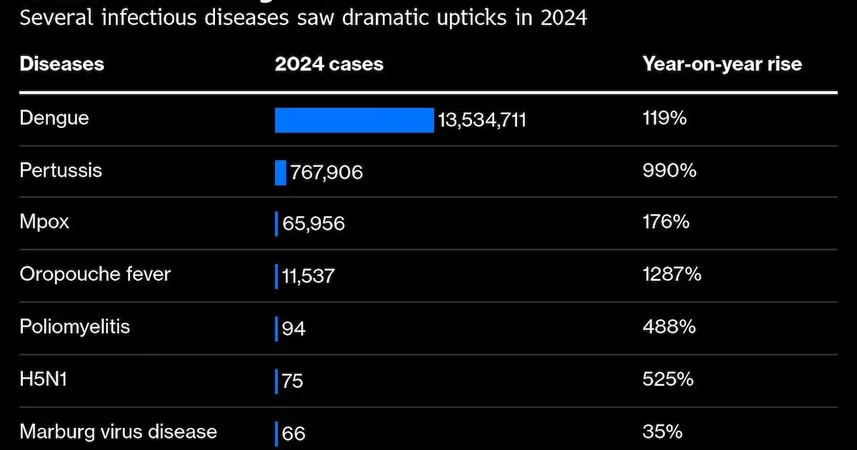
Alarming Surge of Infectious Diseases in 2024: Are We Prepared for the Consequences?
2024-12-23
Author: Michael
Overview
In a startling revelation, a preliminary analysis from Airfinity Ltd., a prominent disease forecasting firm based in London, has uncovered a dramatic resurgence of infectious diseases across the globe in 2024. This increase can be largely attributed to climate change, a decline in vaccination rates, and the emergence of new variants of pathogens.
Dengue Fever and Other Diseases
By the end of December, global dengue fever cases soared to an unprecedented high of over 13 million—a staggering increase from the previous year, with Central and South America experiencing a near tripling of infections. Tragically, this spike in dengue resulted in nearly 10,000 fatalities worldwide. Moreover, the year witnessed a nearly tenfold rise in pertussis (whooping cough) cases compared to 2023. Other diseases such as mpox, oropouche fever, and poliomyelitis have also seen significant upticks in cases.
Regional Concerns
The situation in the United States has raised concerns, with 61 reported cases of humans contracting the H5N1 avian influenza virus by late December. Meanwhile, Rwanda faced its first outbreak of the Marburg virus, notorious for causing severe and often fatal hemorrhagic fever.
Impact of Climate Change
This alarming surge in infectious diseases is being exacerbated by the effects of climate change. The analysis highlighted that shifting climate patterns and extreme temperatures have allowed vectors like mosquitoes and ticks, which carry various pathogens, to thrive and expand into new regions. Notably, 2024 is anticipated to be the hottest year on record, with temperatures averaging 1.62 degrees Celsius above pre-industrial levels, as reported by the EU-funded Copernicus Climate Change Service.
Waning Vaccination Rates
Additionally, falling immunization rates, a consequence of disruptions caused by the COVID-19 pandemic, have paved the way for the resurgence of other preventable diseases. For instance, a new, more virulent strain of mpox has raised alarm bells, especially after it was linked to hundreds of deaths in the Democratic Republic of Congo, compelling the World Health Organization to declare it a global public health emergency for the second time. Furthermore, measles cases have ballooned by a shocking 380% in the U.S. and 147% in Europe due to waning vaccination coverage.
Impact of Conflicts on Disease Management
The analysis also pointed to large-scale population movements and interference in vaccine campaigns resulting from military conflicts, significantly impacting disease management and contributing to the resurgence of polio in Afghanistan and Pakistan—the last two countries where the disease remains endemic.
Call to Action
Kristan Piroeva, an analyst at Airfinity, emphasized the critical need for renewed commitment to preventive health measures and the innovative response to combat these diseases. 'The surge in preventable and climate-sensitive illnesses underlines the urgent need for global cooperation in data sharing and health surveillance to mount a coordinated public health response,' she stated.
Conclusion
With the world facing this dire health threat, the question looms—are we ready to confront the challenges posed by these resurgent diseases? The clock is ticking, and urgent action is needed to safeguard global health.









 Brasil (PT)
Brasil (PT)
 Canada (EN)
Canada (EN)
 Chile (ES)
Chile (ES)
 España (ES)
España (ES)
 France (FR)
France (FR)
 Hong Kong (EN)
Hong Kong (EN)
 Italia (IT)
Italia (IT)
 日本 (JA)
日本 (JA)
 Magyarország (HU)
Magyarország (HU)
 Norge (NO)
Norge (NO)
 Polska (PL)
Polska (PL)
 Schweiz (DE)
Schweiz (DE)
 Singapore (EN)
Singapore (EN)
 Sverige (SV)
Sverige (SV)
 Suomi (FI)
Suomi (FI)
 Türkiye (TR)
Türkiye (TR)